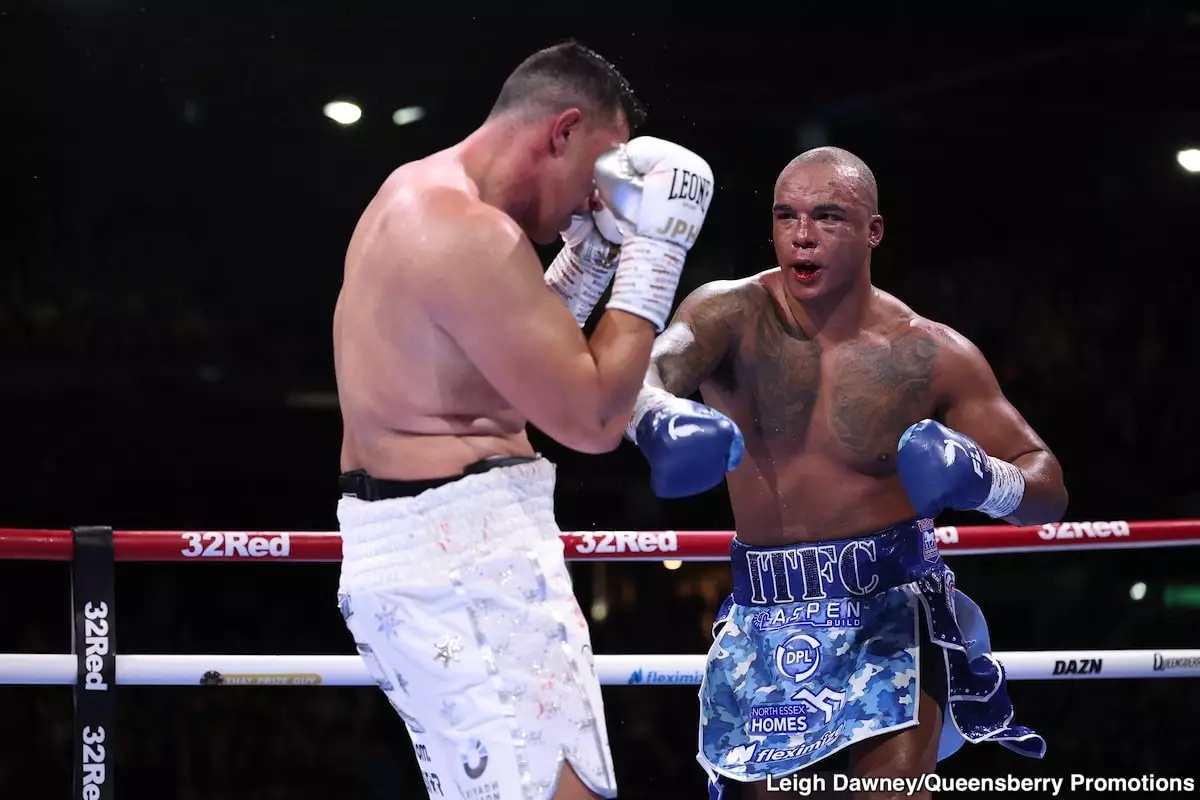In the realm of heavyweight boxing, narratives are often etched not merely by victories or defeats but by the dramatic turns within each bout. The recent showdown between British heavyweight Fabio Wardley and Australian contender Justis Huni epitomizes this unpredictability. Scheduled in Ipswich, the fight became a subject of heated debate following a pivotal moment in the tenth round that prompted claims of a premature stoppage. Amidst the chaos of blood, sweat, and strategy, the unpredictable nature of the sport was on full display as Wardley unleashed a stunning right hook that circled the narrative towards victory, just as defeat appeared imminent.
This explosion of athletic prowess quickly evolved into questions regarding the regulators of the sport—the referees. Huni’s team, led by manager Mick Francis, contended that the fight was halted too soon and argued that Huni, who had managed to get up at the count of eight, was ready to continue fighting. Such contentious claims ignite fervent debates, energizing supporters and critics alike, demonstrating how imperative every decision is within the context of athletic integrity and safety.
Counterarguments from the Corner
Wardley’s response to the fallout illustrated a deeper understanding of the nuances of the sport and its regulations. “The referee is legally allowed to wave the fight off whenever he wants,” he stated, emphasizing the discretionary power vested in officiating that aims to protect fighters. In contrasting interpretations of Huni’s condition post-knockdown, Wardley painted a portrait of a cautious referee discerning between the potential for tragedy and the thrill of continued combat. This has sparked discussions about whether the emotional toll of a fighter’s pride may cloud judgment in recognizing dangerous situations within the ring.
Here lies the crux of the predicament: should a referee prioritize the perceived readiness of a fighter to continue, or should he err on the side of caution? According to Wardley, it’s not merely about completing the count but ensuring that the fighter is “solid physically, mentally, and convince the ref that you’re all there.” The expectations placed on referees are staggeringly high. They are asked not only to judge the moment but also to forecast potential consequences that could lead to career-altering injuries.
Fighter Wisdom in Complex Scenarios
Interestingly, Huni himself offered a deceptively mature perspective in the days following the fight. Despite the wave of controversy his team tried to mount, he maintained an air of composure and humility. “I’m not going to kick up a fuss,” he stated, asserting that Wardley had earned his triumph. This acknowledgment presents a testament to Huni’s character and the broader understanding that the essence of boxing hinges on the personal experiences of athletes both in and out of the ring. His approach exemplifies sportsmanship, a pillar upon which the credibility of boxing ultimately stands.
This duality reflects a larger analog in athletics; assessments from teams, fans, and fighters themselves present a kaleidoscopic view clouded by raw emotion and competitive spirit. The different narratives spawned from the night of the bout challenge the boxing community to acknowledge the balance between competitiveness and safety.
Judgment Calls in a High-Stakes Arena
Even in hindsight, the importance of decision-making in high-stakes environments cannot be overstated. Huni’s team looks set to file a protest with the World Boxing Association to contest the referee’s call—an action that could resurface conversations about existing protocols and their implications for name fighters as well as emerging talent. Such situations call into question the sufficiency of current regulations regarding stoppages and fighter safety, igniting discussions not only within sports media but within regulatory bodies themselves.
In the final analysis, the clash between Wardley and Huni may represent more than a mere athletic competition; it uncovers the layers of complexity involved in ensuring fairness, safety, and respect for the sport. Boxing, as with many sports, is not simply about triumph or loss; it encapsulates a tapestry woven with threads of resilience, honor, and ultimately, the right decisions made in the heat of the moment. Each fighter, referee, and supporter contributes to this rich narrative, emphasizing that the world of boxing thrives on both its unpredictability and its regulation.

